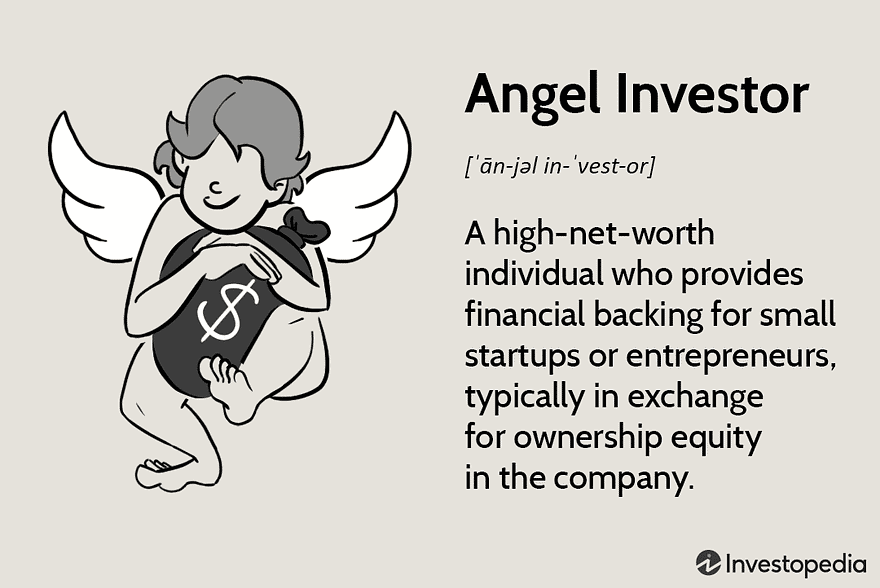
Angel investment is a well-liked method used by business owners to raise money for their enterprises. It involves affluent people investing their own funds in return for stock in a company. Yet, what precisely is an angel investor? Angel investing: What is it? And what was the underlying thought process? These and other inquiries will be addressed in this essay.
What is an Angel Investor?
High net worth individuals that have the cash to invest in start-ups or early-stage businesses are often angel investors. Since they have already founded and expanded their own successful businesses, they frequently have tremendous commercial knowledge and skill. As a result, they are able to provide the businesses they invest in with invaluable advice and coaching.
Angel investors frequently have a strong passion for assisting emerging and creative companies. They can be driven by a desire to give back to the community, to encourage innovative and interesting endeavors, or to support businesspeople in realizing their aspirations. Angel investors have the opportunity to earn sizable returns on their investments while fostering innovation and economic progress by making investments in companies.
What is Angel Investing?

Angel investing is a form of private equity financing that involves investing in early-stage startups or businesses in exchange for equity in the company. Angel investors are typically high net worth individuals who are willing to take on more risk than traditional investors, such as banks or financial institutions.
In contrast to venture capitalists, who frequently spend greater sums of money in more established businesses, angel investors frequently contribute smaller quantities of money to aid startups in getting off the ground. Depending on the size and stage of the company, these investments might cost anywhere from a few thousand dollars to a few hundred thousand.
Early-stage firms appeal to angel investors because of the possibility for significant returns on their capital. They believe in the mission and potential of the firm, and they frequently have a strong enthusiasm for promoting fresh, cutting-edge ideas, therefore they are ready to take on greater risk.
What Goes Through an Angel Investor’s Mind?
Angel investors are highly motivated by the potential for high returns on their investment. They are looking for companies that have the potential to grow rapidly and generate significant profits. Additionally, angel investors are often excited about the prospect of being involved in a new and exciting venture, and may be drawn to companies that are innovative or disruptive in their industry.
When evaluating potential investments, angel investors typically look for startups that have a strong team with a clear vision and a solid business plan. They want to see that the founders have a deep understanding of their industry and market, and have a realistic plan for how they will generate revenue and grow their business over time.
Angel investors are also looking for companies with a competitive advantage, such as a unique product or service, or a strong intellectual property portfolio. They want to see that the company has a clear path to success and a solid plan for how they will achieve their goals.
How Angel Investing Benefits Investors and Startups
For investors, angel investing can be a way to diversify their portfolio and potentially earn high returns on their investment. Angel investors typically invest in multiple startups, which can help to spread out their risk and increase the chances of success. This can be particularly attractive for investors who are looking for alternative investment opportunities that offer potentially high returns.
Angel financing can give entrepreneurs the much-needed money they require to get started. Early-stage businesses may have difficulty obtaining money from conventional sources like banks or venture capitalists. Angel investors can offer the money required to pay for starting expenses, create prototypes, and assemble a team. Angel investors can provide crucial coaching, direction, and networking opportunities in addition to financial support. Several angel investors have wide-ranging professional networks and may connect startups with clients, partners, and funders.
The Risks of Angel Investing: Understanding the Potential Downsides
Angel investing carries some risk. There is no guarantee of success with investments, and investors risk losing all or a portion of their money if the firm fails.
The majority of startups fail during the first few years of operation because they are inherently hazardous. Before making an investment, angel investors must be aware of these dangers and thoroughly assess potential firms. A thorough investigation of the startup’s staff, market, and business plan is part of this process.
It’s also important for angel investors to diversify their investments across multiple startups to mitigate the risk of any single investment. By carefully evaluating and diversifying their investments, angel investors can increase their chances of success and potentially earn significant returns on their investments.
Why do startups need Balloonary?
Startups need Balloonary because it provides them with a streamlined and efficient way to manage their online advertising campaigns. With Balloonary, startups can create ads that take off and reach their target audience across multiple platforms.
For startups in their early stages, this can help them expand their visibility and audience. In addition, Balloonary gives companies access to professional advice and support, which can be quite helpful for those who are just getting started. Startups can minimize costs and maximize promotional impact by utilizing Balloonary.
Conclusion
As a sort of early-stage investment, angel investing entails high net worth individuals contributing money to firms in exchange for stock. Angel investors are frequently seasoned professionals who may provide businesses with helpful advice, mentorship, and networking possibilities.
They are driven by the possibility of receiving significant returns on their investment, the chance to take part in a brand-new and exciting project, or the opportunity to give back to the community. Angel investing can provide benefits to both the investor and the startup. Investors can diversify their portfolio and potentially earn high returns on their investment.
A brief thank you for reading, and keep up with us for more startup moves!





0 Comments